

Jojo Botanical Products, LLC is incorporated in the state of Florida. We offer a unique blend of natural plant based oils based with jojoba that do amazing things for the skin. Moisturizes, protects, reduces scars and dark spots, reduces line and wrinkles, creates smooth and softer skin, anti-aging properties. It is the blend, the formulation and the quality of the products that promote the best result not offered in any other products on the market. The formula was developed by professional formulation specialist to test insure the safety of the product and that it delivers the results in our claims.
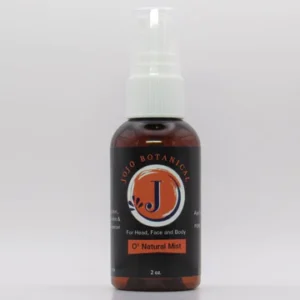
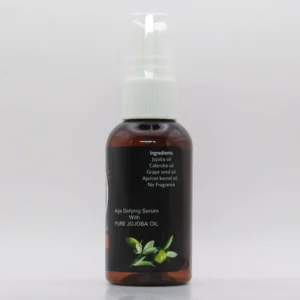
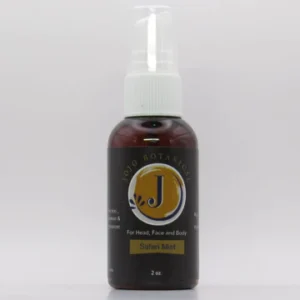
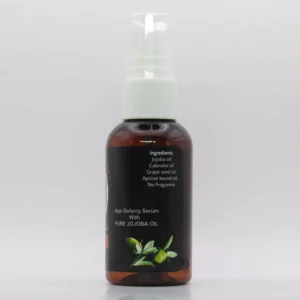
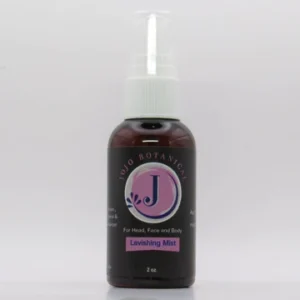
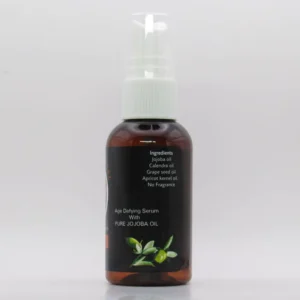
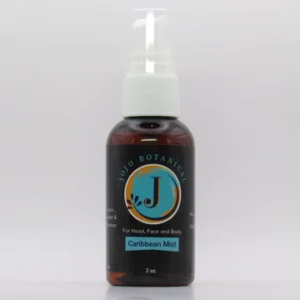
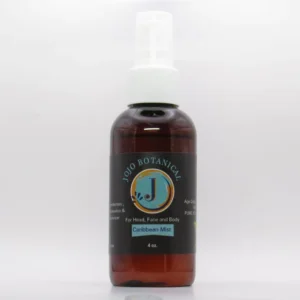

Use daily: After towel drying skin, Apply a few pumps of serum and gently massage into skin.

Benefits of JOJO’s skin serum with Jojoba + 4 super ingredients-Fortified with organic Calendula, Grape seed, Sweet almond and Apricot kernel seed oils. No greasy feeling skin & No toxic chemicals!








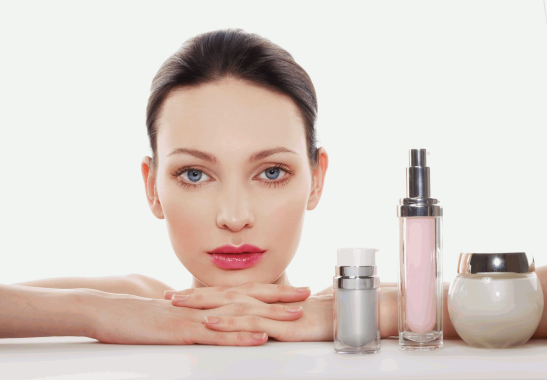


Deeply-Hydrating.
It is lighter than other face oils and easily absorbed into skin. It deeply penetrates to soothe and soften while providing an excellent moisturizing effect and adding a healthy glow.
Long-Lasting Moisturization.
It doesn’t evaporate like water-based moisturizers, which is very important when your skin is exposed to the environment. Studies have shown that Jojoba Oil provides a substantial long-acting layer of moisture.
Nutritious for Skin.
Jojoba is full of nutrients like Vitamin E and B, as well as antioxidants and minerals like chromium, copper, and zinc, which all nourish and protect skin. Organic, cold-pressed, Jojoba Oil has the highest level of antioxidants and nutrients.
Anti-Aging.
Because it is the perfect moisturizer, Jojoba can help slow down the appearance of aging, and help to fade fine lines and wrinkles. In dermatological tests, it was shown that Jojoba Oil increases the skin’s suppleness and the effect was still present as time passed. Tests also showed continued use of Jojoba Oil resulted in reducing superficial facial lines.
Non-Acnegenic.
Because Jojoba Oil is very similar to human skin oils, its use can trick the skin into thinking it has produced enough oil and thus balance oil production, without promoting acne or other skin problems. Jojoba also naturally deters microbes, helping to prevent the growth of bacteria on skin.
Easy, Not Greasy.
Because Jojoba Oil is very similar to our own skin oils, it immediately penetrates skin and smoothes easily, helping to promote healthy, glowing skin without clogging pores or leaving a greasy residue.
Soothes Sunburn.
Jojoba Oil’s hydrating action soothes sunburn and helps reduce the chances of peeling.
Gentle & Non-Allergenic.
Jojoba Oil is recommended for people with sensitive skin (including psoriasis and eczema) because of its gentle nature. Applying Jojoba Oil to compromised skin can help reduce flare-ups.
Soothes Dry Skin.
Jojoba Oil has anti-inflammatory properties which help to tame chaffing and chapping, reduce redness caused by drying, ease the effects of eczema and rosacea, and keep skin calm and comfortable. The Vitamin E and B-complex vitamins in the Jojoba Oil help in skin repair and damage control.
Anti–Microbial.
Jojoba Oil naturally deters microbes, helping to prevent the growth of bacteria on skin. This property makes it useful for those with acne, and also provides an added wound-healing benefit. Bonus: Jojoba Oil acts as a natural preservative.
Calendula oil is a natural oil extracted from marigold flowers (Calendula officinalis). It has been used for centuries in traditional medicine to treat a variety of skin conditions, and it is now becoming increasingly popular in modern skincare.
Here are just some of the potential benefits of calendula oil for skin:
Reduces inflammation and irritation.
Calendula oil has anti-inflammatory and antibacterial properties, which can help to soothe and calm irritated skin. It may also be helpful for treating conditions such as eczema, psoriasis, and diaper rash.
Promotes wound healing.
Calendula oil has been shown to promote wound healing by increasing blood flow to the affected area and stimulating the growth of new tissue. It may also help to reduce scarring.
Protects from oxidative stress.
Calendula oil contains antioxidants, which can help to protect the skin from damage caused by free radicals. Free radicals are unstable molecules that can damage cells and contribute to premature aging.
Hydrates and nourishes the skin.
Calendula oil is rich in fatty acids, which help to hydrate and nourish the skin. It may also help to improve the skin’s elasticity and firmness.
Calendula oil is generally safe for most people to use, but it is always best to do a patch test on a small area of skin before using any new product for the first time.
If you have any concerns about using calendula oil, or if you have any underlying skin conditions, be sure to talk to your doctor before using it.
Calendula oil also has a good track record of calming inflammation in the skin. You can apply Calendula oil to the skin to relieve itching and discomfort. When applied to the joints and muscles, it can also reduce pain from sprains or strains. Skincare products containing Calendula oil may benefit persons with inflammatory skin conditions such as psoriasis, eczema, dermatitis.
Calendula oil can help reduce pain and discomfort. This analgesic property is independent of the opioid pathway, so this avenue is being explored more in the health community to minimize the prescription of narcotics. Don’t be surprised if your analgesic cream contains Calendula oil. Applying the oil to the skin is also very soothing.
Are you or someone you know experiencing accelerated skin aging related to stress or illness? You may need to add Calendula oil to your skincare routine if showing signs of aging skin. Calendula oil helps slow down the appearance of fine lines and wrinkles, and other signs of skin aging. Adding this oil to your skin regimen also boosts skin hydration and helps to promote clear, youthful, glowing skin.
Not everyone enjoys clear and glowing skin, as stated earlier, and one of the reasons is not using the best skincare products for your skin type. Or applying too many ingredients to the skin. Have you seen the 10-step or 15-step skincare routine making the rounds on social media? Too much of anything can be bad for your skin. Incorporating Calendula oil makes sense because it performs several functions that replace many other ingredients, reducing the need for multiple components on the skin.
It also possesses properties that help your skin heal faster from irritation or injuries.
Discussions about the skin should not exclude the skin beneath our hair, the scalp. Calendula oil is an excellent scalp moisturizer. It also has antibacterial and antifungal properties, making it suitable to treat dandruff and seborrheic dermatitis . It also helps hydrate the scalp and helps reduce itching. But it does one more thing: it can promote hair growth by reducing inflammation of the scalp. Despite scalp treatment falling under hair care, calendula oil benefits extend to the scalp.
Every dermatologist agrees on one thing: sun protection! Sunscreen functions as an extra layer of protection for the body by reflecting away or absorbing harmful ultra-violet rays of the sun. Calendula oil has some sun-protecting properties. In a study, Calendula oil was found to have an equivalent of SPF 14. You should definitely shoot for SPF 30 in your sunscreen and reapply every 2 hours if you are out in the sun.
Calendula oil provides some short-term benefits for your skin, and one of them is keeping the skin firm. Calendula oil also makes your skin more hydrated and supple.
Grapeseed oil is a light, non-greasy oil that is derived from the seeds of grapes. It is a rich source of essential fatty acids, vitamin E, and antioxidants. Grapeseed oil has been used in traditional medicine for centuries, and recent research has confirmed its many benefits for the skin.
Here are some of the benefits of grapeseed oil for skin:
Moisturizes and hydrates the skin.
Grapeseed oil is a good source of linoleic acid, an essential fatty acid that helps to strengthen the skin barrier and keep the skin hydrated. It also contains vitamin E, which helps to lock in moisture and prevent the skin from becoming dry and flaky.
Reduces inflammation.
Grapeseed oil has anti-inflammatory properties that can help to reduce redness, swelling, and irritation of the skin. This makes it a good choice for people with conditions such as eczema, psoriasis, and rosacea.
Fights acne.
Grapeseed oil contains linoleic acid, which can help to unclog pores and reduce inflammation associated with acne. It also has antimicrobial properties that can help to kill bacteria that cause acne breakouts.
Reduces the appearance of fine lines and wrinkles.
Grapeseed oil is a good source of antioxidants, which can help to protect the skin from free radical damage. Free radicals are unstable molecules that can damage collagen and elastin, which are the proteins that keep the skin looking firm and youthful.
Lightens skin discoloration.
Grapeseed oil contains vitamin E and proanthocyanidins, which can help to lighten dark spots and hyperpigmentation. It can also help to reduce the appearance of acne scars and sunspots.
Grapeseed oil is a versatile oil that can be used in a variety of ways to improve the health and appearance of the skin. It can be applied directly to the skin as a moisturizer, facial oil, or body oil. It can also be added to other skincare products, such as lotions, creams, and masks.
Grapeseed oil is generally safe for all skin types, but it is always best to do a patch test on a small area of skin before using any new product.
Apricot kernel oil is a highly versatile oil with a wide range of benefits for the skin and overall health. It is a rich source of essential fatty acids, including oleic acid (omega 9), linoleic acid (omega 6), and alpha-linolenic acid (omega 3). These fatty acids are essential for maintaining healthy skin and hair, and they also have anti-inflammatory and antioxidant properties.
Apricot kernel oil is also a good source of vitamins A, E, and K. Vitamin A helps to promote cell turnover and collagen production, which can help to reduce the appearance of fine lines and wrinkles. Vitamin E is a powerful antioxidant that protects the skin from damage caused by free radicals. Vitamin K helps to heal wounds and reduce inflammation.
Apricot kernel oil is lightweight and easily absorbs into the skin, making it a good choice for all skin types, including sensitive and dry skin. It is also non-comedogenic, meaning that it will not clog pores. Below are some of the specific benefits of apricot kernel oil:
Moisturizes the skin
Apricot kernel oil is a rich source of fatty acids, which help to hydrate and nourish the skin. It is especially beneficial for dry and mature skin.
Reduces inflammation
Apricot kernel oil has anti-inflammatory properties, which can help to soothe and calm irritated skin. It may also be helpful for conditions such as eczema and psoriasis.
Protects against free radical damage
Apricot kernel oil is a good source of vitamin E, a powerful antioxidant that protects the skin from damage caused by free radicals. Free radicals are unstable molecules that can damage cells and contribute to premature aging.
Promotes cell turnover and collagen production
Apricot kernel oil contains vitamin A, which helps to promote cell turnover and collagen production. This can help to improve the skin’s texture and elasticity, and reduce the appearance of fine lines and wrinkles.
Boosts overall health and wellness
Apricot kernel oil is not only good for the skin, but it may also boost overall health and wellness. It is a good source of essential fatty acids, which are essential for many bodily functions, including heart health, brain function, and inflammation control.
Apricot Kernel Oil for Acne
Overall, apricot kernel oil is a promising natural ingredient for treating acne. It is important to note that more research is needed to confirm its effectiveness. However, based on the available evidence, it is likely that apricot kernel oil can be a safe and effective way to reduce inflammation, soothe breakouts, and prevent future breakouts.
Here are some tips for using apricot kernel oil for acne:
If you have any concerns about using apricot kernel oil for acne, be sure to talk to your dermatologist.
Apricot Kernel Oil for Skin Tone
Yes, apricot kernel oil is a great natural oil for improving skin tone. It is rich in essential fatty acids, vitamins, and antioxidants that can help to nourish, hydrate, and protect the skin. Below are some of the ways that apricot kernel oil can benefit skin tone:
Softening and Cleansing
Apricot kernel oil contains stearic acid, which helps to soften the skin and remove dirt, excess oil, and toxins. This can help to improve the overall appearance of the skin and reduce the appearance of blemishes.
Moisturizing and Healing
Apricot kernel oil is also rich in essential fatty acids, such as omega-3, omega-6, and omega-9. These fatty acids help to strengthen the skin’s barrier function and keep it hydrated. Apricot kernel oil can also help to promote healing and reduce the appearance of scars and blemishes.
Anti-aging
Apricot kernel oil contains antioxidants that can help to protect the skin from free radical damage. Free radical damage is one of the leading causes of premature aging, so using apricot kernel oil can help to keep the skin looking young and radiant.
Reducing Dark Circles
Apricot kernel oil also contains vitamin K, which can help to reduce the appearance of dark circles under the eyes. Vitamin K helps to strengthen the blood vessels and reduce inflammation, which can help to improve the appearance of the under-eye area.
To use apricot kernel oil for skin tone, simply apply a few drops of oil to your face and massage it in gently. You can use apricot kernel oil on its own, or you can add it to your favorite moisturizer or serum. Apricot kernel oil is suitable for all skin types, but it is especially beneficial for dry and mature skin.
Benefits sensitive skin, even baby skin
Sweet almond oil is a natural oil that has been used for centuries for its many benefits for the skin. It is rich in vitamins, minerals, fatty acids, and antioxidants, all of which are essential for healthy skin.
Here are some of the benefits of sweet almond oil for skin:
Moisturizes and hydrates
Sweet almond oil is a lightweight and non-greasy oil that absorbs quickly into the skin. It helps to lock in moisture and keep the skin hydrated, which is especially beneficial for dry and sensitive skin.
Reduces inflammation:
Sweet almond oil has anti-inflammatory properties that can help to soothe and calm irritated skin. It can be helpful for conditions such as eczema, psoriasis, and rosacea.
Protects from sun damage
Sweet almond oil contains vitamin E, a powerful antioxidant that helps to protect the skin from damage caused by free radicals. Free radicals are unstable molecules that can contribute to premature aging and other skin problems.
Reduces the appearance of wrinkles and fine lines
The fatty acids and antioxidants in sweet almond oil can help to improve the skin’s elasticity and reduce the appearance of wrinkles and fine lines.
Fades scars and stretch marks
Sweet almond oil can help to fade the appearance of scars and stretch marks by promoting cell regeneration.
Removes makeup
Sweet almond oil can be used to gently remove makeup without clogging pores.
Sweet almond oil is generally safe for all skin types, but it is always best to do a patch test before using any new product on your skin. To use sweet almond oil for skin, simply apply a few drops to your skin and massage gently until absorbed. You can use sweet almond oil on its own or add it to your favorite moisturizer or sunscreen.
If you are looking for a natural and effective way to improve the health of your skin, sweet almond oil is a great option and safe for most skin types.


